Western Sydney University: Mental Health Nursing Assignment 401013
VerifiedAdded on 2022/10/06
|6
|1028
|122
Homework Assignment
AI Summary
This assignment solution addresses a mental health nursing case study, focusing on a client exhibiting signs of a self-care deficit and mental health concerns. The student identifies an urgent risk area, specifically the client's loss of appetite and weight loss, supported by current literature, and proposes an intervention involving encouraging the client to eat with family and providing a balanced diet. The assignment also identifies a mental health concern, supported by literature, and suggests therapeutic communication as an intervention. The student further discusses ethical issues such as patient confidentiality and autonomy. The document uses APA 6th style referencing and fulfills the requirements of the 'Promoting Mental Health and Wellbeing 1' unit at Western Sydney University.
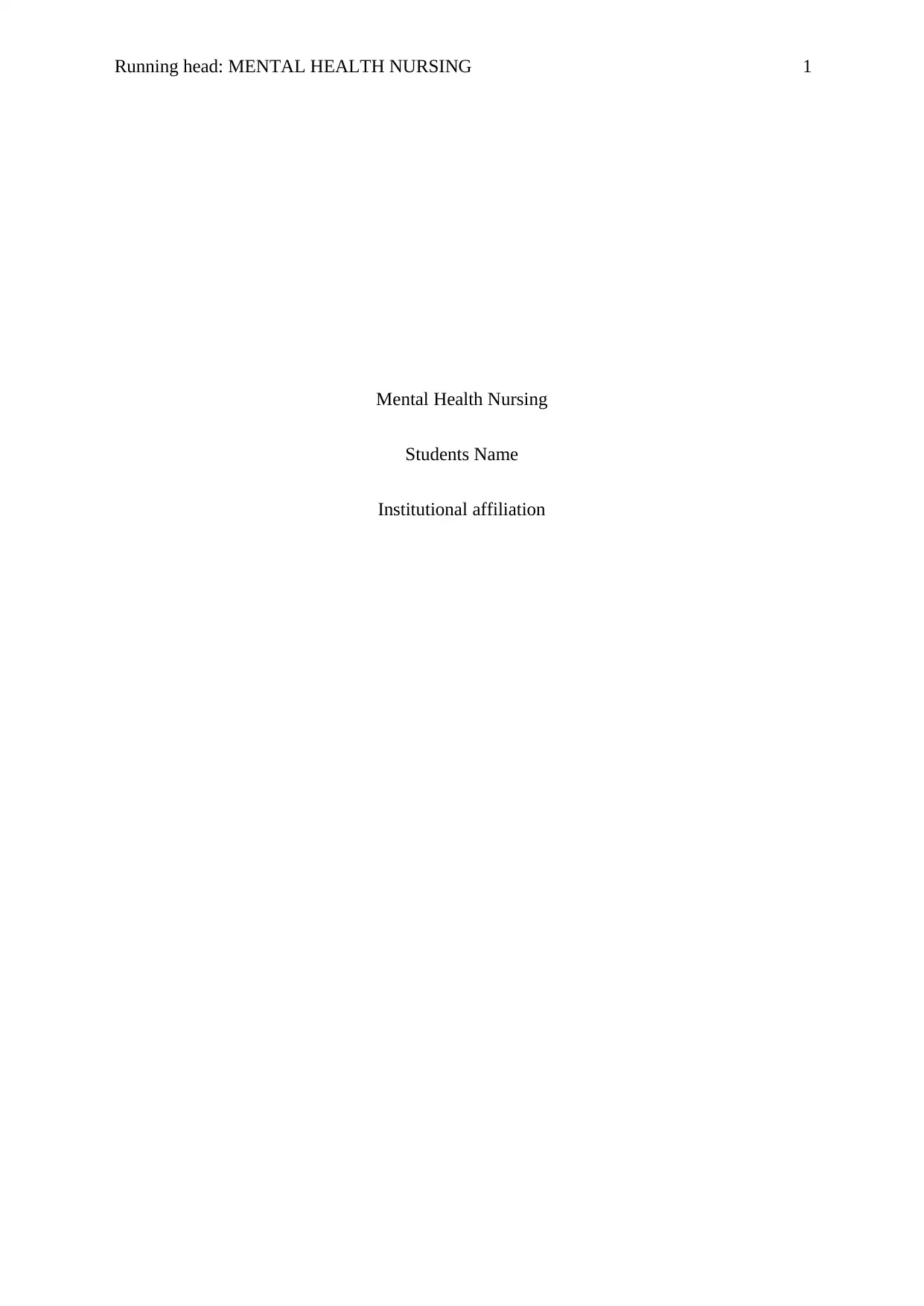
Running head: MENTAL HEALTH NURSING 1
Mental Health Nursing
Students Name
Institutional affiliation
Mental Health Nursing
Students Name
Institutional affiliation
Paraphrase This Document
Need a fresh take? Get an instant paraphrase of this document with our AI Paraphraser
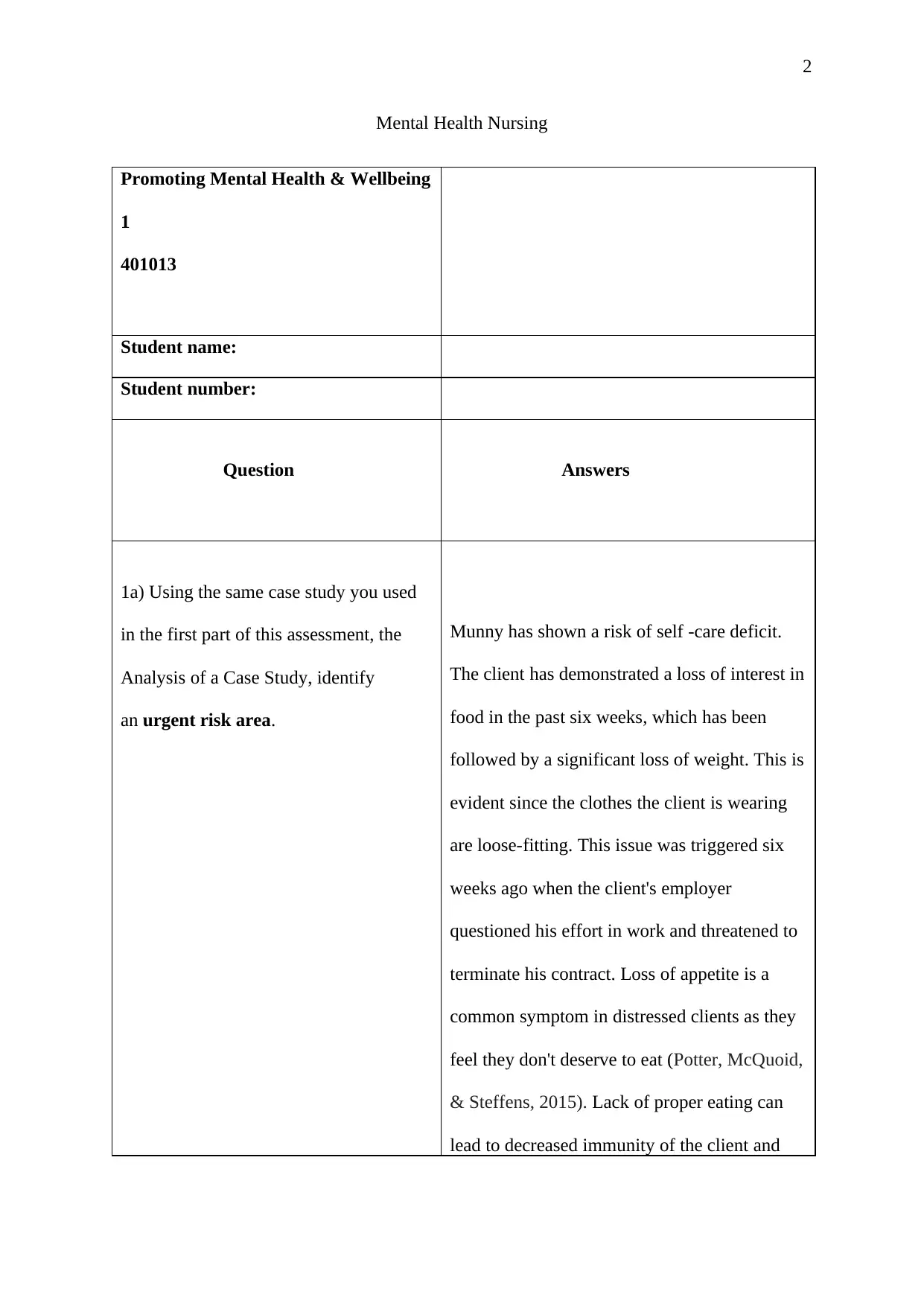
2
Mental Health Nursing
Promoting Mental Health & Wellbeing
1
401013
Student name:
Student number:
Question Answers
1a) Using the same case study you used
in the first part of this assessment, the
Analysis of a Case Study, identify
an urgent risk area.
Munny has shown a risk of self -care deficit.
The client has demonstrated a loss of interest in
food in the past six weeks, which has been
followed by a significant loss of weight. This is
evident since the clothes the client is wearing
are loose-fitting. This issue was triggered six
weeks ago when the client's employer
questioned his effort in work and threatened to
terminate his contract. Loss of appetite is a
common symptom in distressed clients as they
feel they don't deserve to eat (Potter, McQuoid,
& Steffens, 2015). Lack of proper eating can
lead to decreased immunity of the client and
Mental Health Nursing
Promoting Mental Health & Wellbeing
1
401013
Student name:
Student number:
Question Answers
1a) Using the same case study you used
in the first part of this assessment, the
Analysis of a Case Study, identify
an urgent risk area.
Munny has shown a risk of self -care deficit.
The client has demonstrated a loss of interest in
food in the past six weeks, which has been
followed by a significant loss of weight. This is
evident since the clothes the client is wearing
are loose-fitting. This issue was triggered six
weeks ago when the client's employer
questioned his effort in work and threatened to
terminate his contract. Loss of appetite is a
common symptom in distressed clients as they
feel they don't deserve to eat (Potter, McQuoid,
& Steffens, 2015). Lack of proper eating can
lead to decreased immunity of the client and
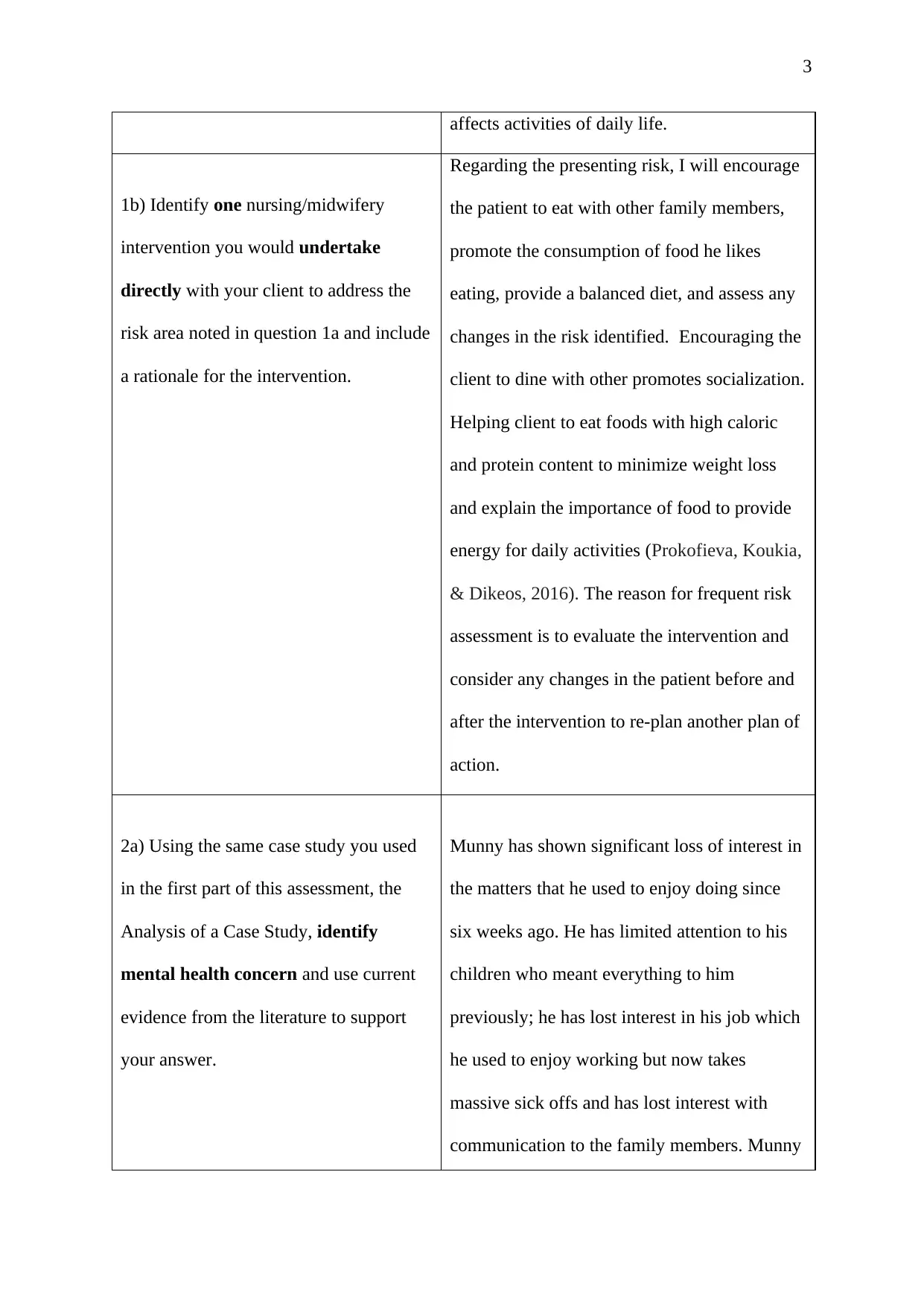
3
affects activities of daily life.
1b) Identify one nursing/midwifery
intervention you would undertake
directly with your client to address the
risk area noted in question 1a and include
a rationale for the intervention.
Regarding the presenting risk, I will encourage
the patient to eat with other family members,
promote the consumption of food he likes
eating, provide a balanced diet, and assess any
changes in the risk identified. Encouraging the
client to dine with other promotes socialization.
Helping client to eat foods with high caloric
and protein content to minimize weight loss
and explain the importance of food to provide
energy for daily activities (Prokofieva, Koukia,
& Dikeos, 2016). The reason for frequent risk
assessment is to evaluate the intervention and
consider any changes in the patient before and
after the intervention to re-plan another plan of
action.
2a) Using the same case study you used
in the first part of this assessment, the
Analysis of a Case Study, identify
mental health concern and use current
evidence from the literature to support
your answer.
Munny has shown significant loss of interest in
the matters that he used to enjoy doing since
six weeks ago. He has limited attention to his
children who meant everything to him
previously; he has lost interest in his job which
he used to enjoy working but now takes
massive sick offs and has lost interest with
communication to the family members. Munny
affects activities of daily life.
1b) Identify one nursing/midwifery
intervention you would undertake
directly with your client to address the
risk area noted in question 1a and include
a rationale for the intervention.
Regarding the presenting risk, I will encourage
the patient to eat with other family members,
promote the consumption of food he likes
eating, provide a balanced diet, and assess any
changes in the risk identified. Encouraging the
client to dine with other promotes socialization.
Helping client to eat foods with high caloric
and protein content to minimize weight loss
and explain the importance of food to provide
energy for daily activities (Prokofieva, Koukia,
& Dikeos, 2016). The reason for frequent risk
assessment is to evaluate the intervention and
consider any changes in the patient before and
after the intervention to re-plan another plan of
action.
2a) Using the same case study you used
in the first part of this assessment, the
Analysis of a Case Study, identify
mental health concern and use current
evidence from the literature to support
your answer.
Munny has shown significant loss of interest in
the matters that he used to enjoy doing since
six weeks ago. He has limited attention to his
children who meant everything to him
previously; he has lost interest in his job which
he used to enjoy working but now takes
massive sick offs and has lost interest with
communication to the family members. Munny
⊘ This is a preview!⊘
Do you want full access?
Subscribe today to unlock all pages.

Trusted by 1+ million students worldwide
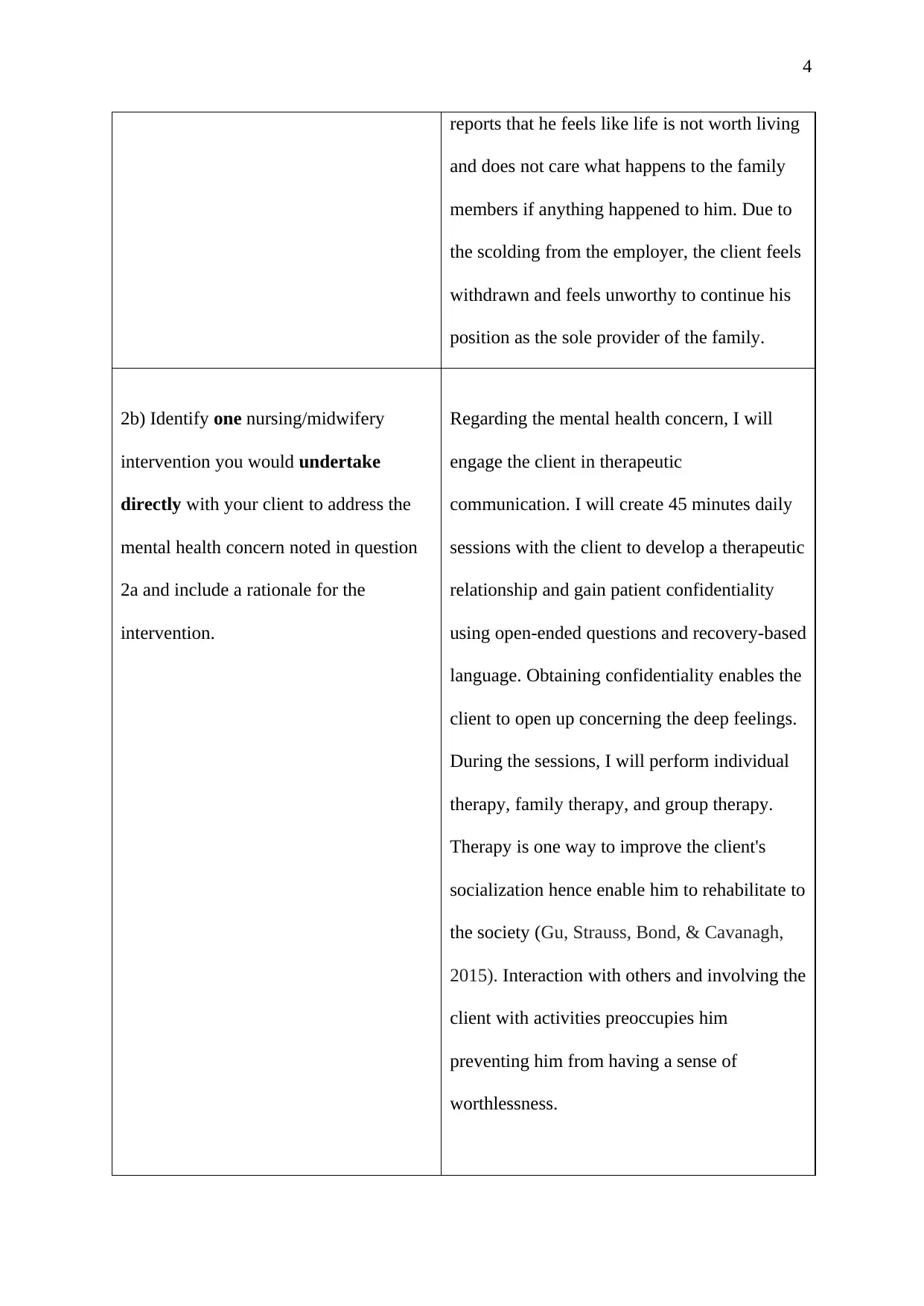
4
reports that he feels like life is not worth living
and does not care what happens to the family
members if anything happened to him. Due to
the scolding from the employer, the client feels
withdrawn and feels unworthy to continue his
position as the sole provider of the family.
2b) Identify one nursing/midwifery
intervention you would undertake
directly with your client to address the
mental health concern noted in question
2a and include a rationale for the
intervention.
Regarding the mental health concern, I will
engage the client in therapeutic
communication. I will create 45 minutes daily
sessions with the client to develop a therapeutic
relationship and gain patient confidentiality
using open-ended questions and recovery-based
language. Obtaining confidentiality enables the
client to open up concerning the deep feelings.
During the sessions, I will perform individual
therapy, family therapy, and group therapy.
Therapy is one way to improve the client's
socialization hence enable him to rehabilitate to
the society (Gu, Strauss, Bond, & Cavanagh,
2015). Interaction with others and involving the
client with activities preoccupies him
preventing him from having a sense of
worthlessness.
reports that he feels like life is not worth living
and does not care what happens to the family
members if anything happened to him. Due to
the scolding from the employer, the client feels
withdrawn and feels unworthy to continue his
position as the sole provider of the family.
2b) Identify one nursing/midwifery
intervention you would undertake
directly with your client to address the
mental health concern noted in question
2a and include a rationale for the
intervention.
Regarding the mental health concern, I will
engage the client in therapeutic
communication. I will create 45 minutes daily
sessions with the client to develop a therapeutic
relationship and gain patient confidentiality
using open-ended questions and recovery-based
language. Obtaining confidentiality enables the
client to open up concerning the deep feelings.
During the sessions, I will perform individual
therapy, family therapy, and group therapy.
Therapy is one way to improve the client's
socialization hence enable him to rehabilitate to
the society (Gu, Strauss, Bond, & Cavanagh,
2015). Interaction with others and involving the
client with activities preoccupies him
preventing him from having a sense of
worthlessness.
Paraphrase This Document
Need a fresh take? Get an instant paraphrase of this document with our AI Paraphraser
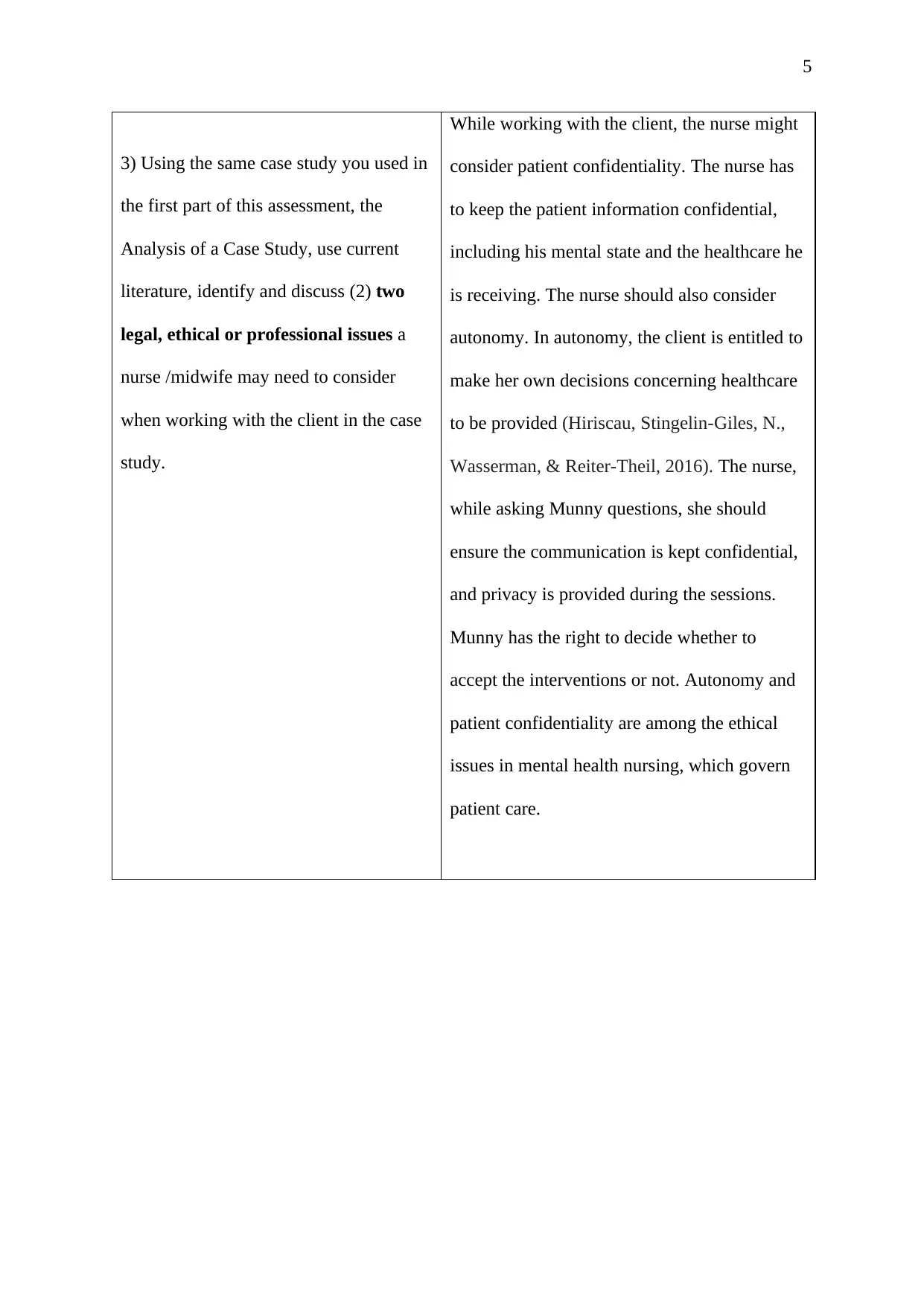
5
3) Using the same case study you used in
the first part of this assessment, the
Analysis of a Case Study, use current
literature, identify and discuss (2) two
legal, ethical or professional issues a
nurse /midwife may need to consider
when working with the client in the case
study.
While working with the client, the nurse might
consider patient confidentiality. The nurse has
to keep the patient information confidential,
including his mental state and the healthcare he
is receiving. The nurse should also consider
autonomy. In autonomy, the client is entitled to
make her own decisions concerning healthcare
to be provided (Hiriscau, Stingelin-Giles, N.,
Wasserman, & Reiter-Theil, 2016). The nurse,
while asking Munny questions, she should
ensure the communication is kept confidential,
and privacy is provided during the sessions.
Munny has the right to decide whether to
accept the interventions or not. Autonomy and
patient confidentiality are among the ethical
issues in mental health nursing, which govern
patient care.
3) Using the same case study you used in
the first part of this assessment, the
Analysis of a Case Study, use current
literature, identify and discuss (2) two
legal, ethical or professional issues a
nurse /midwife may need to consider
when working with the client in the case
study.
While working with the client, the nurse might
consider patient confidentiality. The nurse has
to keep the patient information confidential,
including his mental state and the healthcare he
is receiving. The nurse should also consider
autonomy. In autonomy, the client is entitled to
make her own decisions concerning healthcare
to be provided (Hiriscau, Stingelin-Giles, N.,
Wasserman, & Reiter-Theil, 2016). The nurse,
while asking Munny questions, she should
ensure the communication is kept confidential,
and privacy is provided during the sessions.
Munny has the right to decide whether to
accept the interventions or not. Autonomy and
patient confidentiality are among the ethical
issues in mental health nursing, which govern
patient care.
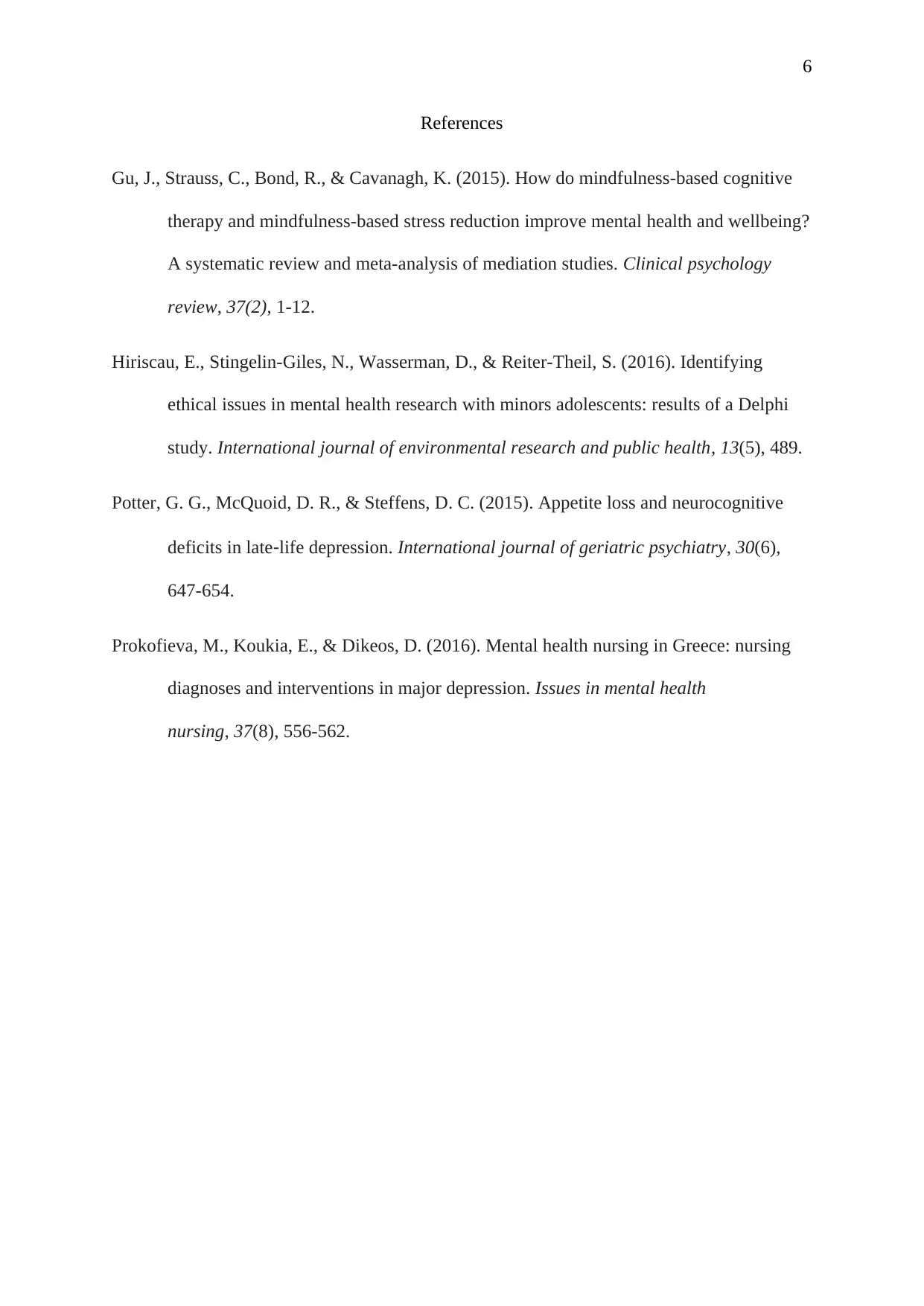
6
References
Gu, J., Strauss, C., Bond, R., & Cavanagh, K. (2015). How do mindfulness-based cognitive
therapy and mindfulness-based stress reduction improve mental health and wellbeing?
A systematic review and meta-analysis of mediation studies. Clinical psychology
review, 37(2), 1-12.
Hiriscau, E., Stingelin-Giles, N., Wasserman, D., & Reiter-Theil, S. (2016). Identifying
ethical issues in mental health research with minors adolescents: results of a Delphi
study. International journal of environmental research and public health, 13(5), 489.
Potter, G. G., McQuoid, D. R., & Steffens, D. C. (2015). Appetite loss and neurocognitive
deficits in late‐life depression. International journal of geriatric psychiatry, 30(6),
647-654.
Prokofieva, M., Koukia, E., & Dikeos, D. (2016). Mental health nursing in Greece: nursing
diagnoses and interventions in major depression. Issues in mental health
nursing, 37(8), 556-562.
References
Gu, J., Strauss, C., Bond, R., & Cavanagh, K. (2015). How do mindfulness-based cognitive
therapy and mindfulness-based stress reduction improve mental health and wellbeing?
A systematic review and meta-analysis of mediation studies. Clinical psychology
review, 37(2), 1-12.
Hiriscau, E., Stingelin-Giles, N., Wasserman, D., & Reiter-Theil, S. (2016). Identifying
ethical issues in mental health research with minors adolescents: results of a Delphi
study. International journal of environmental research and public health, 13(5), 489.
Potter, G. G., McQuoid, D. R., & Steffens, D. C. (2015). Appetite loss and neurocognitive
deficits in late‐life depression. International journal of geriatric psychiatry, 30(6),
647-654.
Prokofieva, M., Koukia, E., & Dikeos, D. (2016). Mental health nursing in Greece: nursing
diagnoses and interventions in major depression. Issues in mental health
nursing, 37(8), 556-562.
⊘ This is a preview!⊘
Do you want full access?
Subscribe today to unlock all pages.

Trusted by 1+ million students worldwide
1 out of 6
Related Documents
Your All-in-One AI-Powered Toolkit for Academic Success.
+13062052269
info@desklib.com
Available 24*7 on WhatsApp / Email
![[object Object]](/_next/static/media/star-bottom.7253800d.svg)
Unlock your academic potential
Copyright © 2020–2025 A2Z Services. All Rights Reserved. Developed and managed by ZUCOL.



